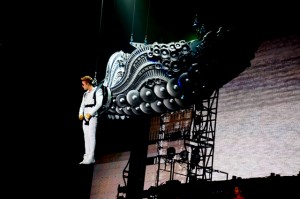You may know him as the man behind the dirty Wurlitzer of the Benevento-Russo Duo. You may remember him as the left hand man of Garage A Trois. You may recognize him as Robert Plant transmitted through a Hammond organ from Bustle In Your Hedgerow, but you should know him as the riff mastermind soundscape artist Marco Benevento. While he is certainly a man about…everywhere, his trio of three years, as well as his new album, Tigerface, is where it’s at. It’s tough to catch up with Benevento and his hot-rodded piano, but luckily Coloradans from all corners will be afforded a chance in just a couple of weeks.
What is a hot-rodded piano you might ask? Listen Up Denver! was wondering the same thing when we got a chance to talk with Benevento while he took a break from his East Coast tour in the beautiful and historic Mill Valley of California. According to Benevento, a hot-rodded piano is outfitted with “transducer pick-ups that you would stick on acoustic guitars, or cellos, or violins. You know, those flat, metal, circular kinds of pick-ups. I use those to give my piano a quarter inch out so I can run it into pedals and amps,” the former of which Benevento has many. They sit on his piano (and under it) waiting to be tweaked in order to pull sounds out of a piano the likes of which you have never heard.
It wasn’t always easy to lock down a piano for every gig on tour and this age old quandary of the piano man began to give up its foggy secrets to Benevento after he played a serendipitous gig at the famous Café Largo in L.A. where the infamous Jon Brion keeps a residency, and, apparently, a good deal of his toys. “John Brion plays there frequently and keeps a lot of his gear there—keyboards, he has a Celeste there and what not—but in one of the little rooms there was a sixty one note upright piano. I saw it and I was like, ‘they make these little upright pianos?’ It seemed like it could be moved easily by two people and I immediately started searching for them on Craigslist and eBay.” What Benevento discovered was intriguing.
In a time before iPods and portable speakers, before the transistor radio and before it was easy to plug and lug a fairly new invention called the record player – when music was needed, as it inevitably was – people actually performed music live. Whenever, wherever. This was the age of Jazz, the Roaring Twenties. An age when folks still crisscrossed the country in trains and they needed music. Thus was born the sixty-one key piano, small enough to fit in a tight dining car and, eighty years later, perfect for a resourceful and innovative musician to incorporate into his new trio. “I finally got a call from somebody who had one in New York State and I went up and got it. I freaked out because as a piano player it’s really difficult to not bring your own instrument to a gig especially if you want to play piano! Or if you play a room that has a piano, most likely that room has seats, and most likely that room is a Jazz room, or if it’s a rock club they have a shitty upright sitting backstage that’s hardly been played.” The intimacy that comes from the acoustic piano is palpable in Benevento’s sound, but don’t think for a second that Marco isn’t up to his old tricks,. “The piano is run through a ton of effects, the same amount of effects I would run through the Wurlitzer with the Duo. I also have a looper that I’m triggering different loops that we play along to with my feet. I have a laptop with a keyboard as well, but mainly my two hands are on the piano. In Garage A Trois or The Duo I’m playing bass lines with my feet or bass lines with my left hand, plus right hand lines on another instrument. So in that way this is a little simpler because I just have two hands on a piano and that is kind of nice. While I like covering bass lines this allows me to just focus on playing the chords, melodies, and harmonies.”
Chords, melodies, and harmonies are what makes Benevento’s latest album, Tigerface, pop with fierce experimental individuality while still encompassing what Matt Butler, leader of Everyone Orchestra with whom Benevento plays frequently calls, “Marcoesque melodies.” That said, the first song on the record, “Limbs Of A Pine,” is a departure from previous Benevento albums mainly because it has lyrics written and sung by Rubblebucket vocalist Kalmia Traver but also for other reasons. “I really wanted to make sure that the song was glowy and kind of poppy. I feel that a lot of the songs, even though they’re experimental and the majority of the record is instrumental, are more accessible. It’s almost a Pop sounding record. A lot of the melodies are easy to hum along to, you know, catchy ones that stick in people’s heads.”
While this is true, Benevento is the first to admit that the album lacks a certain cohesiveness. “I feel like there is a lot of focus on every song, maybe that’s why there’s a lot of different songs on the record. It can almost be a little ADD and some people don’t like that aspect of my records; the fact that one song sounds like a happy Pop song and one song sounds like an obscure Jazz song.” This is, however, what makes the album worth its salt. Every song is unique and each sets different moods as they convey new ideas. As good as it is, Benevento, as his own worst critic (as every musician should be), is still not satisfied and he looks to his influences (as every musician should) for guidance. “When some people get a record they hear the first song and want to know that the rest of the record is kind of like that first song,” he said. “For example every song on the new Dr. John record, Locked Down, sounds awesome and it’s very vibey in the same sort of style. Locked Down is easy to digest and very easy and cool to follow. That’s a goal of mine. To make a record where someone would hear one song and be like: ‘Do all the songs sound like that?’ And I would like to say ‘yes!’ Maybe my next record will be more like that. Who knows? I should almost go back and listen to the four records I’ve made and try to come up with a compilation of songs that would go on one record.”
Benevento seemed to have album cohesiveness on his mind when he named the second song on the record “This Is How It Goes.” It not only showcases Benevento’s own lyric writing skills but also sheds light on his craft as a songwriter. “On ‘This Is How It Goes’ I had the chord progression in mind but I really didn’t know what the melody was going to be,” he admitted. “The version of ‘This Is How It Goes’ that made it on to Tigerface was take two of four takes. I basically improvised a melody over the progression every time and picked the one I liked the best and actually wrote words to it. So that part was pretty improvisational, that melody writing.” From there the album explodes into a conveyance of ideas, moods, and soundscapes with the whimsical “Fireworks,” the brooding “Soma,” and the furious pace of “Escape Horse.” “Escape Horse” is a song that fits its name perfectly by throwing the listener out of the second story window of a saloon onto the back of a Chestnut Mare to ride through the desert escaping into the great and rambling West, just as the Benevento Trio will do as they chart a course out to visit Colorado.
Benevento is no stranger to Colorado and touts it as one of his favorite tour destinations. “Over the last six or more years of touring, Colorado has been a really fun place to go. I’ve played at The Boulder Theater. I’ve played at The Fox. I used to play at a place called Trilogy in Boulder, which was a wine bar…I don’t think it’s even there anymore. So, I’ve played in Boulder and Denver all over the place,” he said. “The crowds have been great and the reception of the music has been awesome. There’s a lot of college kids around and I feel like college kids are just stoked to see live music as often as they possibly can. There are good crowds, and it’s definitely not a sterile environment. It’s a very, very fun environment and I love being up in the mountains.”
That love for the mountains is a good thing as Marco begins his five-night Colorado run on January 16th at Agave in Avon before heading to 320 South in Breckenridge, PAC 3 in Carbondale, down to Quixote’s True Blue, and then back up to Barkley’s in Frisco to close out the run on January 20th. Although Benveneto’s group began playing jazzy sit down clubs, the band has morphed into a foot stomping bar band that keeps audiences on their toes. “All of the sounds you hear on the records you’ll hear live. It’s all on the looper or on the computer or our sound guy may put some effects on the drums to make them sound like they did on the record.”
If you like the sounds on Tigerface then you will be pleased to know that Benevento has already begun work on his fifth album. While he is having a blast with his trio, consisting of Dave Dreiwitz on bass (Ween) and Andy Borger on drums (Norah Jones, Tom Waits), don’t count the Duo out just yet. “Joe [Russo] and I have talked about getting the Duo up and running. We just don’t know when it will happen,” he said. “We want to focus on making a record but it’s kind of on the back burner because I’m busy with my own band and Joe is busy with Furthur.”
In the meantime Benevento will focus on making records and touring with his trio. The world is truly a carpet laid before Marco Benevento, a man about everywhere.







Nice article. Kalmia Traver is from Rubblebucket though, not Rubberneck. Fun band.